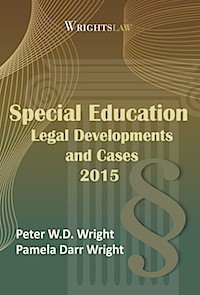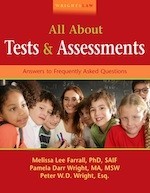Supreme Court Revisits FAPE Requirements in
Endrew F. v. Douglas Co. Sch. Dist. RE-1 on January 11, 2017

Endrew F. is a child with autism and ADHD. His disabilities affect his cognitive functioning, language and reading skills, and social abilities, including his ability to communicate his emotions and needs.
Drew attended public school in Douglas County, Colorado from preschool through fourth grade where he received special education through Individualized Education Programs (IEPs).
Drew's parents contend that he did not make academic progress in second grade, third grade or fourth grade. Most of the objectives in his IEPs were discontinued or abandoned. His IEPs suggest that he did not make the progress needed to receive educational benefit and a free, appropriate public education (FAPE).
Drew also had severe behavior problems that prevented him from learning. Beginning in second grade, he yelled, cried, banged his head, kicked, tore off his clothes, and ran away from class and from school. These behaviors prevented him from functioning in school and in the community.
The school agreed that Drew needed a behavior intervention plan (BIP) but failed to develop and implement a Plan. Drew's behaviors spiraled out of control.
At the end of fourth grade, Drew's frightened parents withdrew him from the public school and placed him in a private school that specializes in educating children with autism.
His parents requested that the school district reimburse them for his tuition. An Administrative Law Judge held that Douglas School District provided a program in which Drew made "some progress" so the parents were not entitled to reimbursement for their son's education.
After reviewing the record, a federal judge held that the IEPs "... were sufficient to show a pattern of, at the least, minimal progress." The judge held that a public school is only required to provide a "basic floor of opportunity" ... [and] "some educational benefit."
In 2015, the Court of Appeals for the Tenth Circuit affirmed the decisions of the ALJ and district court. That court held that IDEA requires “some educational benefit” that “must merely be more than de minimis” and that under this minimal standard, the IEP developed for Drew’s fifth grade year was adequate. The parents appealed to the U.S. Supreme Court.
To learn about educational benefit, FAPE, and why a 35-year-old case called Rowley still matters today, read Educational Benefit: “Merely More Than De Minimis” or “Meaningful”?
https://www.wrightslaw.com/law/art/endrew.douglas.benefit.fape.htm
To learn more about special education legal issues - educational benefit, FAPE, discrimination, damages - and the Endrew F. case - see Wrightslaw: Special Education Legal Developments and Cases 2015.
Pete and Pam Wright plan to attend oral argument at the Supreme Court next week - we'll keep you posted. |













